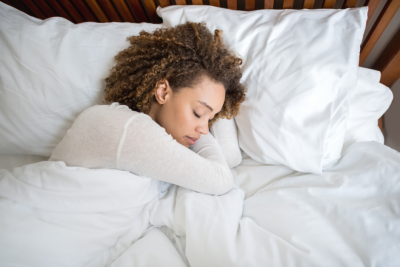What is Sleep Health?
Sleep is biological and behavioral. Healthy sleep includes adequate duration, regular daily schedules, few nighttime awakenings, satisfaction, and high daytime alertness. Your sleep cycle includes light sleep, deep sleep, and rapid eye movement (REM) sleep. Your brain and bodily functions are active at this time. Good sleep is vital to most body functions, mood, and function during the day.
Poor sleep leads to significant health problems, such as heart disease, diabetes, and obesity. It also leads to difficulty with work, school, social relationships, and other activities.

Recommended Sleep Duration
Age Group
Age
Sleep Recommended Daily
Newborn
0-3 months
14-17 hours
Infant
4-12 months
12-16 hours (including naps)
Toddler
1-2 years
11-14 hours (including naps)
Preschool
3-5 years
10-13 hours (including naps)
School Age
6-12 years
9-12 hours
Teen
13-17 years
8-10 hours
Adult
18-60 years
7 or more hours
Adult
61-64 years
7-9 hours
Adult
65 years and older
7-8 hours
Source: CDC; Table developed by CDC1
Common MYTHS About Sleep
While it is common for circadian rhythms to change as we age, adults still need sleep. Often, older adults struggle to get good quality sleep and for a long enough duration for their body to recover and be active for the next day.
Your body needs uninterrupted time to sleep so your body and brain can recover through the sleep stages. Lack of sleep can negatively affect cognitive and bodily functions such as memory, focus, and digestion. While naps may help decrease daytime sleepiness, they are not a substitute for sleep and can disrupt your circadian rhythm.
Drowsy driving is unsafe and it can take only a moment of inattentive driving to be a danger to yourself and others.
As you age, life can get busier and you may be awoken by anxiety, pain, or environmental factors. Adjustments in lifestyle can reduce sleep disturbances. Uninterrupted sleep is a necessity for healthy functioning.
While some light snoring may not be harmful, snoring that is loud and frequent may be a sign of a sleep disorder. Loud snoring can wake both you and anyone that can hear the snoring up, as well as, not provide the body with enough oxygen. If you suspect that you may have a snoring issue, consult your primary care provider.
If you can’t fall back asleep, it may be better to get out of bed and do a relaxing activity. Light activity can tire the brain out enough to go back to sleep. It can also allow the brain to associate your bed with sleeping.
Resources
- (English) In Brief: Your Guide to Healthy Sleep Fact Sheet by the National Heart, Lung, and Blood Institute; National Institutes of Health; U.S. Department of Health and Human Services
- (Español) En resumen: su guía para un sueño saludable por el Instituto Nacional del Corazón, los Pulmones y la Sangre; Institutos Nacionales de Salud; Departamento de Salud y Servicios Humanos de EE. UU.
1Reference to specific commercial products, manufacturers, companies, or trademarks does not constitute its endorsement or recommendation by the U.S. Government, Department of Health and Human Services, or Centers for Disease Control and Prevention. This material is otherwise available on the agency website for no charge.